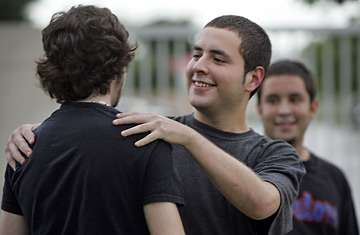
Juan Gomez hugs his friend Justin Hesser as Alex Gomez, behind, watches.
When teenage brothers Juan and Alex Gomez were awakened at dawn on July 25 and arrested by U.S. immigration officials, they simply became two more among the thousands of kids who get snared in deportation dragnets along with their parents. But this week Juan's Internet-savvy high school friends in Miami have turned his case into a cause celebre in Washington — and even if the brothers eventually do get deported, the publicity they've garnered may well boost the passage of a federal immigration bill that would keep other young people like them from suffering the same fate in the future.
Juan, 18, and Alex, 19, were toddlers when their Colombian parents brought them on a visit to the U.S. in 1990. Despite having only a six-month visa, the family did not return to their war-torn country and remained in Florida. They started a modest business, sidestepping federal immigration authorities for almost two decades. The boys, meanwhile, grew up as Americans and excelled at school — especially Juan, who mastered 15 advanced-placement courses at Miami's Killian Senior High School and almost aced the SAT before graduating this past spring. Because the law denies benefits such as in-state tuition to undocumented immigrants, the Gomezes could only afford community college for their sons — but both were determined to earn college degrees.
Each year some 65,000 kids graduate from high school in the U.S. under similar circumstances. Thousands face deportation along with their parents if the family gets collared for breaking immigration laws, as the Gomezes clearly did. But unlike most undocumented kids, who often live in the shadows like their parents, Juan had a U.S. citizen army of school chums in his corner who cried foul: You can't send Juan and Alex to live in a Third World country they don't even know, they argued, simply because of something their parents did. With the Gomez family sitting in a South Florida detention center, the students set up a war room at a house in suburban Miami and started commandeering global networking web sites like Facebook.com.
Then, this week, they stormed D.C. with a teen lobbying effort that seemed like something out of Mr. Smith Goes To Washington. "We're going to give it our all," Scott Elfenbein, one of Juan's schoolmates, told reporters on Capitol Hill. "We have to show [Congress] the flaws in the system." Says Kelleen Corrigan, detention attorney for the Florida Immigrant Advocacy Center (FIAC) in Miami, which is working on behalf of Juan and Alex, "Juan is lucky to have such a dedicated, extremely astute group of friends. It's been really touching to watch."
It apparently touched the Beltway effectively enough to get U.S. Immigration and Customs Enforcement on Wednesday to suspend the Gomez family's deportation proceedings, and release them from detention, for 45 days. That's long enough, their supporters hope, to get Congress to consider private legislation introduced this week by U.S. Representative Lincoln Diaz-Balart of Miami that would allow the brothers to remain in the U.S. at least until the current Congress ends in January 2009.
By then, they're betting, Congress will have passed what's known as the DREAM Act — Development, Relief and Education for Alien Minors — co-sponsored in the Senate by Democrat Dick Durbin of Illinois and Republicans Richard Lugar of Indiana and Chuck Hagel of Nebraska, and in the House by Repubican Diaz-Balart and Democrats Howard Berman and Lucille Roybal of California. The measure would allow kids like Juan and Alex to stay in the U.S. and receive residency once they receive a college degree or serve two years in the military. It would also give those undocumented youths access to in-state tuition and other college aid benefits.
Critics call the DREAM Act — which was part of President Bush's failed immigration reform package and is now a stand-alone bill — just another amnesty reward for lawbreaking. But backers say it's a sensible response to a growing national dilemma — and one that rewards "the cream of the crop, the kids who are genuine college material and those who really want to contribute to American society," says Mary Gundrum, FIAC's managing attorney for immigration.
Despite the 45-day reprieve for Juan and Alex, Congress so far is balking at even addressing the private legislation drafted for them. But the case's sudden and remarkable high profile — even CNN immigration grouch Lou Dobbs suggested this week that an exception might be in order for the brothers — has raised hopes that the DREAM Act could get a vote in both chambers as early as this fall. "This is really allowing the movement to crystallize," says Jose Luis Marantes, youth organizer for the Florida Immigrant Coalition who is working alongside Juan's friends in Washington this week. Diaz-Balart spokesperson Ana Carbonell concurred: "It's allowed us to show Congress the human face of those whom we're trying to assist."
But the current anti-immigration mood on Capitol Hill, especially among conservative Republicans, could end up ruining the DREAM. Immigration lobbyists like Marantes say they're still seeking the support of key legislators like Florida Senator Mel Martinez, the Republican National Committee chairman, who has yet to commit to the measure as a stand-alone bill. But maybe that's because he hasn't yet been lobbied by the kids from Killian Senior High.
